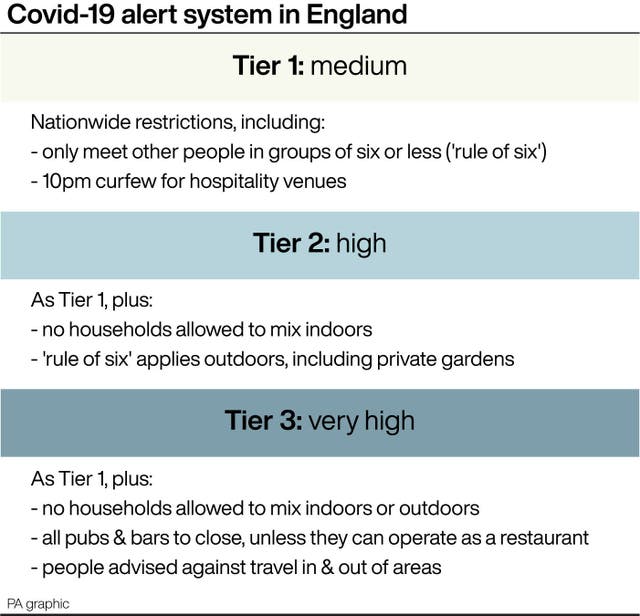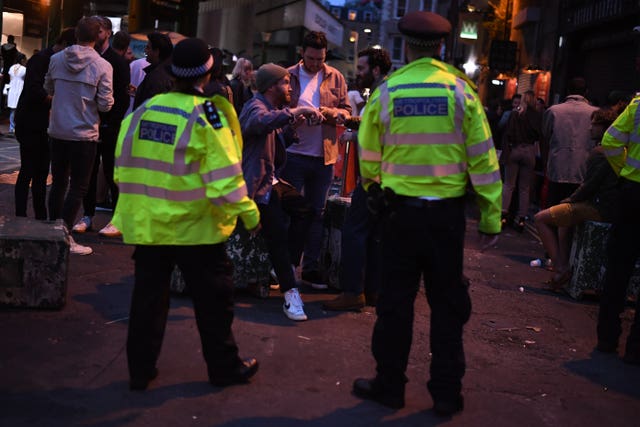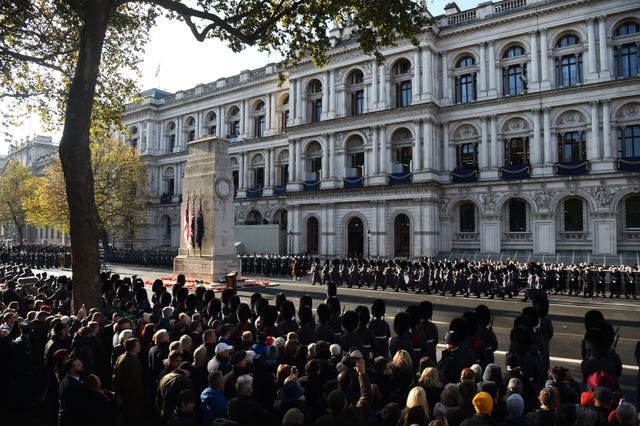What does the law say on Tier 3 coronavirus restrictions?
Lancashire will face the tougher Tier 3 rules from Saturday, joining the Liverpool City Region.

Lancashire is set to join the Liverpool City Region as the second area in England to face the most severe coronavirus lockdown restrictions.
The North West county will face the tougher Tier 3 rules from Saturday, the Government has said.
The PA news agency looks at what the laws say.
– What does Tier 3 mean?
Tier 3 is known as the “very high” alert level. This is the highest level of restrictions in place under the tier system.

– What restrictions are in place?
People are banned from socialising with anybody they do not live with, or who are part of a linked household, indoors or in private gardens as well as in most outdoor hospitality venues, including funfairs and fairgrounds.
Groups of six can still meet outdoors in public places which do not have an entry fee and at outdoor sports grounds or sports facilities, botanical gardens and the grounds of a castle, stately home or historic house.
– Are there any exceptions?
Yes, several, which are similar to previous and existing rules.
They include any reasonable excuse for a necessary gathering: for work; to provide education, training or charity services; for childcare; to provide emergency assistance and to avoid risk of illness or injury and to escape harm; to provide care to a vulnerable person; in order to move house and to fulfil a legal obligation.
Some “permitted organised gatherings” can take place in larger groups of up to 30 people.

Marriage ceremonies and wedding receptions can also continue as long as no more than 15 people attend and they do not take place in a private dwelling.
Support group meetings are also permitted with the same caveats.
Funerals are still allowed, with 30 people able to attend as long as it is not in a private dwelling. But wakes are limited to 15 people and cannot take place in a private house.
Organised protests can take place.
Risk assessments should be carried out for large gatherings and those attending should follow Government guidance, according to the regulations.
Elite athletes can still meet others for training and competitions.
– What about Remembrance Sunday?
There is a separate clause in the law for gatherings commemorating Remembrance Sunday, limiting the number of people attending.

– How will businesses be affected?
All pubs and bars must close unless they are serving food with alcohol.
Any restaurants, pubs, bars, members’ clubs and dining areas in hotels serving food with drink which can stay open must all adhere to the 10pm curfew, although takeaway services can continue overnight.
The law says such venues need to provide a “table meal” with any alcohol served – describing this as the type of meal expected at lunch or in the evening, or as a “main course at either such meal”.
Hotels can only sell alcohol for consumption on their premises.
Nightclubs and other venues that open at night, play music and have a dancefloor must also shut, as well as cinemas, theatres, bowling alleys, indoor gyms, casinos, bingo halls, betting shops, and adult gaming centres.
The ban is expected to extend to soft play areas and car boot sales when the law is updated.
Supermarkets, convenience stores and petrol stations can stay open.
– What happens if I break the rules?
You could be handed a £100 fine, the cost of which will double for each repeat offence up to a maximum of £6,400.
Businesses breaking restrictions face fines starting from £1,000 up to £10,000.
Those found to be holding a gathering of more than 30 people against the rules will be fined £10,000, as is currently in place across the country.
These are similar to the fines already in place for existing laws.
– How long will the rules be in place?
They expire in six months.
In the meantime, the Government must review the need for each of the restrictions at least once every 28 days, with the first due to be carried out by November 11.





